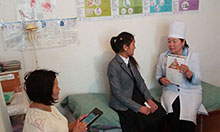 In 2016, SPRING/Kyrgyz Republic implemented a new mobile and cloud-based monitoring system for routine data collection. The system streamlines data flow for more efficient analysis and better management and is specifically designed to meet SPRING’s goals of:
In 2016, SPRING/Kyrgyz Republic implemented a new mobile and cloud-based monitoring system for routine data collection. The system streamlines data flow for more efficient analysis and better management and is specifically designed to meet SPRING’s goals of:
- tracking project activities in the field in real time
- providing access to real-time data on process indicators
- supporting management decision-making
- increasing employee productivity.
SPRING replaced paper forms to track trainings, reach, coverage, supportive supervision, and other outputs with electronic forms that field staff complete on tablets and mobile devices. Then, when internet coverage is available, the data are uploaded to the cloud and are accessible to monitoring and evaluation staff and managers in Bishkek for further analysis and reporting. The mobile data collection system of has increased the efficiency and quality of routine data collection. It also includes built-in data quality checks and integration with Google Maps for geographic visualization and mapping.
Previously, data was collected on paper forms and transported to Bishkek where data entry would take place before analysis could be performed. In some cases, the process was delayed because forms were arriving with improperly-written or missing data, which required follow-up. Another issue with the previous method is that manual data entry is subject to human error and can compromise the quality of the datasets and analyses. In addition to the improvements in the quality of data collection, mobile data has sped up data availability. Data collected in remote areas is immediately organized and available in real time.
The team also used mobile technology for supportive supervision checklists while assessing the quality of infant young child feeding (IYCF) and anemia consultations by health workers. SPRING has seen a 42% improvement in the quality of nutrition counseling using the supportive supervision checklists among trained healthcare providers. Data from supportive supervision checklists are immediately collated and can be shared with the Ministry of Health to advocate for the institutionalization of supportive supervision in health facilities. The information is also shared with health facilities on oblast and rayon levels so they can take stock of their strengths and improve upon weak areas of counseling.
